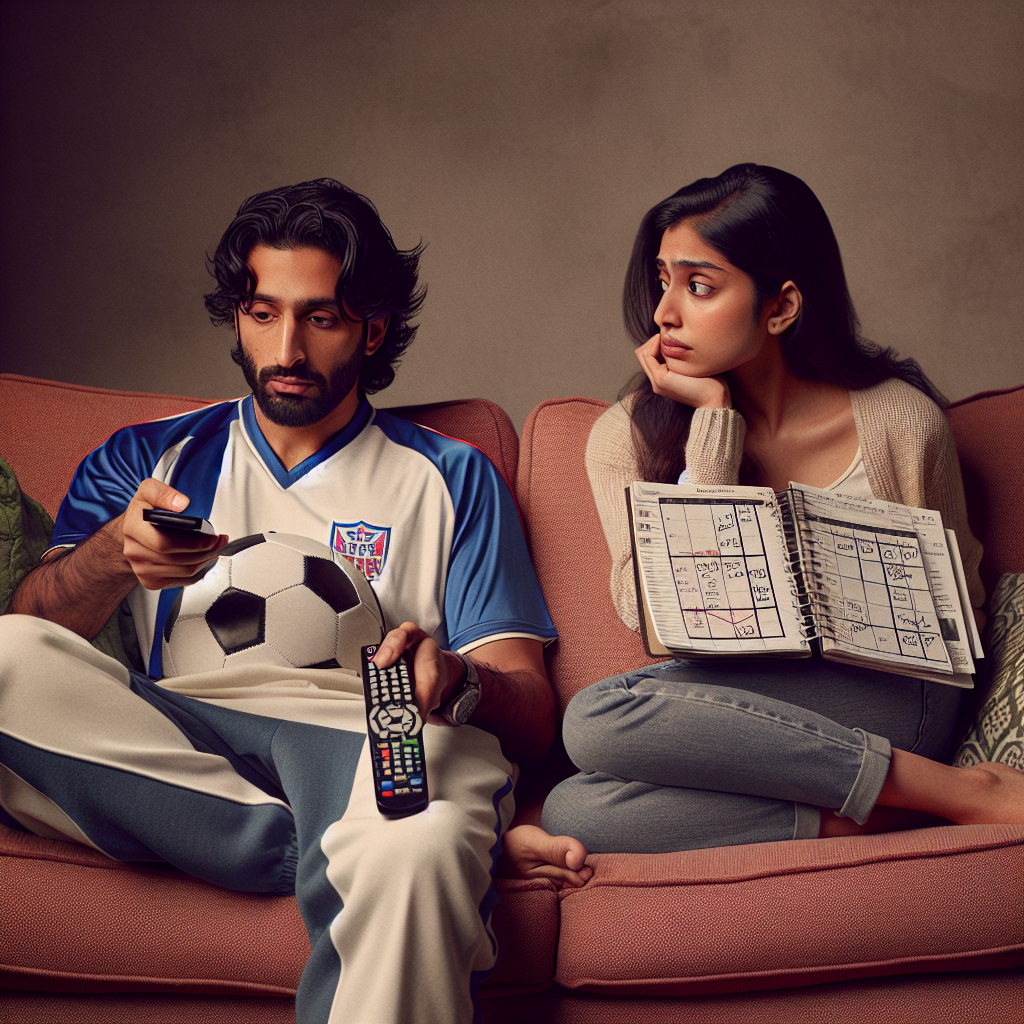Are you often finding yourself frustrated when your boyfriend’s sports activities interfere with your plans together? It can be exasperating when you’re all set for a romantic dinner or a weekend getaway, and suddenly, his commitment to his favorite sports team takes priority. In this article, we will explore the underlying reasons why your boyfriend’s sports seem to have such a significant impact on your plans, and provide you with some helpful tips on how to navigate this situation and find a balance between his sports and your shared time together.

Scheduling Conflicts
Competing Priorities
When your partner is heavily invested in sports, it often means that they have other commitments and obligations associated with it. These can include practices, games, or even team meetings. As a result, their schedule becomes filled with these activities, making it difficult to find time for other plans.
Limited Availability
With a busy sports schedule, your partner’s availability may become limited. They may need to prioritize their involvement in sports, which can leave you feeling like your plans have to take a backseat. It can be frustrating when you have something important or exciting to do but have to work around their sports commitments.
Unpredictable Schedule
Sports schedules can often be unpredictable, with last-minute changes or rescheduled games. This uncertainty can make it challenging to plan anything in advance, leaving you constantly adjusting your plans and feeling like you can’t rely on a set schedule.
Emotional Impact
Feeling Neglected
When your partner’s sports take precedence over your plans, it’s natural to feel neglected. It’s not that their love for you diminishes, but the constant prioritization of sports can make you feel like you’re not a priority in their life. This can lead to feelings of sadness, frustration, or even a sense of jealousy towards their sports activities.
Resentment
Over time, unresolved conflicts arising from scheduling conflicts and a lack of attention can breed resentment. If you consistently feel like you come second to sports, it can create tension within the relationship. This resentment can begin to erode the foundation of your relationship, potentially causing long-term damage if not addressed.
Loneliness
When your partner’s sports take up a significant portion of their time, you may find yourself feeling lonely. Whether it’s attending games alone or spending evenings without their presence, the absence of your partner can leave you yearning for their companionship. This loneliness can lead to a sense of disconnection and an emotional strain that affects your overall well-being.

Financial Considerations
Expensive Tickets
Attending games or matches can come with a hefty price tag. From ticket costs to parking fees, concessions, and even merchandise, the expenses associated with sports can add up quickly. This financial burden can impact your ability to participate in other activities or even strain your joint finances.
Travel Costs
If your partner’s support extends beyond local games, there may be travel involved. Whether it’s driving a few hours or hopping on a plane to follow their favorite team, travel costs can be significant. The expenses of accommodation, transportation, and meals can create financial strain, potentially limiting your ability to allocate resources to other aspects of your shared life.
Sports Merchandise
Sports fandom often goes hand-in-hand with collecting team merchandise. While some view it as a way to show support and enhance the game-day experience, these purchases can quickly add up. Jerseys, hats, scarves, and other team-related items can sap your disposable income and impact your overall financial stability.
Physical and Mental Exhaustion
Injuries and Recovery Time
Sports can take a toll on your partner’s physical well-being. From minor sprains to more severe injuries, the risk of getting hurt is inherent in many sports activities. These injuries not only require time for recovery but can also impact your partner’s energy levels and ability to engage in other plans or activities.
Fatigue
The demanding nature of sports, from intense practices to physically demanding games, can leave your partner feeling fatigued. This exhaustion can seep into their non-sporting life, affecting their engagement in other activities, including date nights or quality time together. Their depleted energy levels may leave you feeling disappointed and unable to enjoy their company fully.
Lack of Energy for Plans
Engaging in sports can be physically and mentally demanding. After dedicating a significant portion of their time and energy to their sporting activities, your partner may find themselves with limited energy for other plans. This lack of energy can result in canceled dates or reduced participation in activities that you had planned together.

Obsession and Fanaticism
Dedication to the Team
Sports fandom often involves a deep dedication to a particular team. This dedication may manifest in various ways, such as watching every game, knowing player statistics by heart, or even joining fan clubs. While this level of involvement can be a positive trait, it can also lead to an obsession that consumes your partner’s time and attention, affecting your plans and shared experiences.
Neglecting Other Interests
When someone becomes overly fixated on sports, it’s easy for them to neglect other interests, hobbies, or personal goals. This one-sided focus can lead to a lack of balance in their life and strain their relationship with you. It’s essential for individuals to maintain a healthy range of interests and allocate time to other aspects of their life beyond sports.
Inability to Compromise
Navigating conflicts between sports involvement and other aspects of life can be challenging when your partner is consumed by their dedication to their favorite team. This devotion may hinder their ability to compromise on scheduling conflicts or prioritize your needs and desires. The inability to find common ground can strain your relationship and create a sense of dissatisfaction.
Social Life Impact
Time with Friends
Sports commitments can take up a significant amount of your partner’s time, making it difficult for them to participate in social events with friends. Whether it’s missing a friend’s birthday party or skipping out on a group gathering, your partner’s absence can lead to feelings of isolation and sadness, both for you and your social circle.
Attending Social Events
While sports events may bring excitement and camaraderie, they can also prevent you and your partner from attending other social events. This limitation can leave you feeling disconnected from your social circle and make it challenging to maintain important friendships outside of your relationship.
Difficulty Making Plans
The unpredictability of sports schedules can make it challenging to make plans with friends or other couples. Last-minute changes or rescheduled games can disrupt previously scheduled activities, making it difficult to find opportunities for social interactions. This difficulty in making plans can lead to frustration and a sense of being left out in social settings.

Relationship Communication
Lack of Open Dialogue
When conflicts arise from the impact of sports on your plans, it’s essential to engage in open and honest communication. However, the dedication to sports can sometimes hinder such dialogue, resulting in unaddressed concerns and unresolved conflicts. It becomes crucial for both partners to actively foster an environment where open communication is prioritized.
Unresolved Expectations
Conflicting expectations can arise when one partner’s sports involvement clashes with the desire for shared time and experiences. Without open communication and a mutual understanding of each other’s expectations, these conflicts can persist and put a strain on the relationship.
Compromising on Priorities
Finding a balance between your partner’s sports commitments and the shared priorities of your relationship requires compromise from both parties. It’s crucial to engage in open dialogue, actively listen to each other’s needs, and work towards finding mutually agreeable solutions. This compromise allows for the cultivation of a healthy and thriving relationship.
Mismatched Interests
Different Hobbies
It’s normal for partners to have different interests and hobbies. However, significant discrepancies in interests, such as one partner being heavily involved in sports while the other has different hobbies, can create challenges. This mismatch may lead to limited shared activities and difficulty in finding common ground to bond over.
Conflicting Passions
When passion for sports conflicts with other personal passions and interests, tensions can arise in the relationship. It’s important for both partners to acknowledge and respect each other’s individual passions while finding ways to incorporate shared activities that bring joy and fulfillment to both parties.
Finding Common Ground
Navigating the challenges of mismatched interests requires effort and willingness from both partners to find common ground. It may involve exploring new activities together or periodically participating in each other’s interests to foster a stronger connection. Striving for a balance of shared experiences and individual pursuits can help maintain a healthy relationship dynamic.

Couples’ Time and Quality
Distracted Attention
When your partner’s focus is consistently drawn towards sports, it can be challenging to have their undivided attention during your time together. Their enthusiasm for their favorite team or sporting event may result in distracted attention, impacting the quality of your interactions and ultimately affecting your relationship dynamics.
Lack of Intimacy
Intimacy, both physical and emotional, is an essential aspect of a healthy relationship. However, the time and energy demands of sports can leave your partner feeling drained, resulting in a lack of intimacy. This lack of closeness can leave you feeling unsatisfied and put a strain on the overall quality of your relationship.
Importance of Quality Time
Quality time is crucial for building and maintaining a strong connection with your partner. However, when sports consistently impede on your time together, it becomes important to actively prioritize and create opportunities for meaningful interactions. Carving out dedicated quality time allows for a deeper bond and strengthens the foundation of your relationship.
Resolving the Conflict
Setting Boundaries
Establishing boundaries is a crucial step in resolving conflicts arising from sports impacting your plans. Communicate your needs and expectations clearly with your partner, discussing what is and isn’t acceptable within the context of your relationship. Setting boundaries allows for a clearer understanding of each other’s limitations, facilitating a healthier balance between sports and other aspects of your shared life.
Creating a Schedule
Creating a schedule or calendar that includes both your partner’s sports commitments and shared activities can help address conflicts and manage expectations. By having a visual representation of both sets of commitments, you can identify potential clashes in advance and work together to find solutions that allow for mutually satisfying compromises.
Compromise and Understanding
Resolving conflicts surrounding sports involvement ultimately requires compromise and understanding from both partners. It’s essential to listen to each other’s perspectives, empathize with the emotional impact of sports on your relationship, and work towards finding a middle ground that caters to both your needs. Through open communication and a willingness to meet each other halfway, conflicts can be resolved, fostering a happier and more harmonious relationship.
In conclusion, when your partner’s interest in sports affects your plans, emotional, financial, and physical strains can arise. It’s important to address these conflicts through open communication and understanding. By setting boundaries, creating schedules, and striving for compromise, you can navigate the impact of sports on your relationship, finding a healthier balance between shared activities and individual passions. Remember, with patience, empathy, and a willingness to work together, conflicts arising from sports involvement can be addressed, leading to a stronger and more fulfilling relationship.






